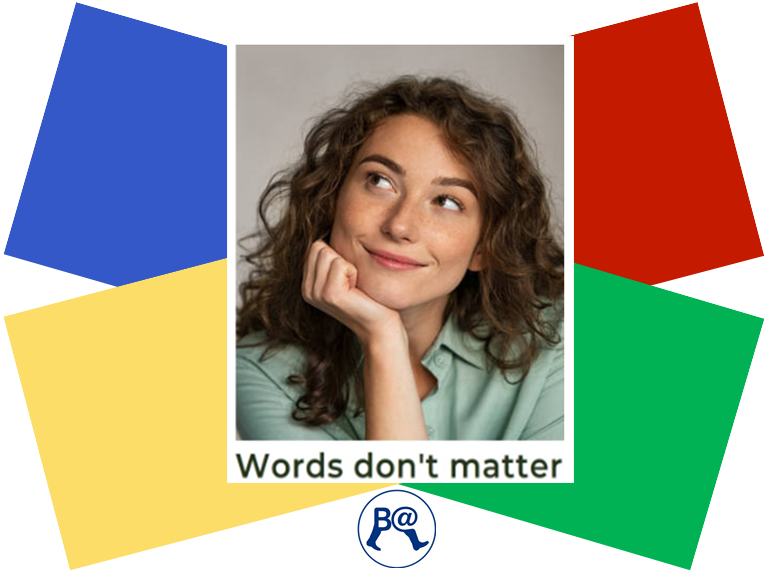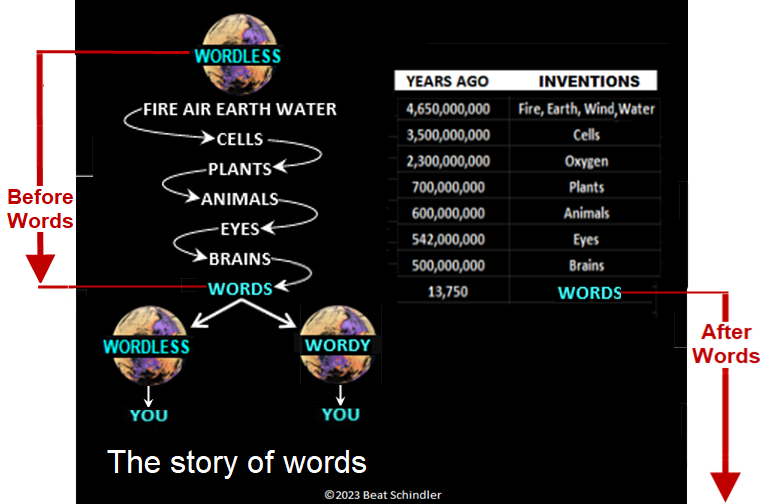
Who am I to tell you that words don’t matter?
You can say that as the author of THE ORIGIN OF HUMANITY, I don’t have a clue what I’m talking about.
But of this you may be sure: Words don’t matter.
Of course, I may be wrong.
I may be wrong simply because different things are being said about words as we speak, depending on who or what is saying them.
With many talking and nobody listening, everybody knows that nothing is believed until it’s true, and that whom or what to believe is a question of word-user character and preferences, to each their own.
No other word or word-user can decide it for you.
We live in a world of matter
We live in a world of matter.
Unless you live in a cave on a distant planet, I have reasons to believe you’ve heard of “e = mc²”.
Tiny particles far smaller than atoms make up the universe as we know it.
But there is a mystery.
Of all the particles discovered, the 2nd strangest and 2nd most elusive are the neutrinos, also known as the ghost particles.
But the strangest and most elusive of all the matter in the universe is the word.
Words defy our understanding of how the universe works.
Hunting for the word
Inside the world-renowned laboratory Fermilab, in Illinois, USA, scientists are hunting unsuccessfully for the word because the word has even less electric charge than the ghost particles.
Electric charge, hence matter, doesn’t exist until it is observed by an instrument that can detect it.
But words have no electric charge. Words are void of matter.
In other words, words don’t matter.
It’s impossible for even the world’s most sensitive detector, the LUX-Zeplin in South Dakota, USA, to detect a word inside of a word-user’s body or brain.
If the impossible were possible — if word-users could detect matter in a word — it would transform our understanding of the universe.
In the beginning is the word
You don’t have to be a word-master to know what in the beginning is the word means.
But you must know how it all began.


Before Words
Above marked in red, nothing that you now have a word for exists in the wordless world Before Words.
After Words
Equally marked in red, everything you now have a word for exists in the wordy world After Words because in the beginning is the word.
That’s how humanity, you, and everything else you have a word for began.
Takeaway
I’m not one to make up new opinions.
You have two choices.
You can believe:
- “In the beginning is the word.” – Word-masters
- “Using words to talk of words is like using a pencil to draw a picture of itself, on itself.” – Patrick Rothfuss
- “What a word means, a sentence cannot say.” – Ludwig Wittgenstein
- Words are a prison, but even a prison is a home if you have the key.
- Everything you have a word for is a word.
- Everything you know is a word.
- Words are what you respond to.
- Words are how you aim at what you’re looking for.
- A word is in the beginning of everything you have a word for, you included.
- The appearance of words has revolutionized evolution.
- Words have not only changed everything you have a word for, they create it.
- Words are a gift we’re meant to keep.
- Words don’t describe the world, they merely describe how we see it.
- Words have not only changed what we see, but how we see.
- Words are the limits of your world. Once you see that, they cease to be the limits of your world.
- Words are not taught at school.
- The story of words is not told.
- Word-masters have know that in the beginning is the word since the beginning of words.
- Word-users love to use their words.
- Words tend to get mistaken for evidence, and we often treat them that way.
- If you have a word for it, it’s a word.
- If you ignore what words can do to you, then you can have no empathy for what words can do to others.
- Words do not matter (they possess zero electric charge).
- Words have no meaning.
- Words can be denied only by confirming them.
- Words defy our understanding of how the universe and evolution work.
Call it a dream, it doesn’t change anything.
Or
Or you can believe what you read about words elsewhere.
To know what that is, relax, I did the hard work for you and to discover what that is, scroll down to the end of this post.
Call to action
It’s decision time.
It’s time to believe between either of two things being said about words as we speak:
What you read here.
Or what you read elsewhere.
No other word-user can decide it for you.
If not now, then when?
PS.
If so inclined, click here for “Word Quotes Worth Reading Twice”
What you read about words elsewhere
Artificial Intelligence (AI)
“A word is a speech sound or a combination of sounds, or its representation in writing, that symbolizes and communicates a meaning and may consist of a single morpheme or a combination of morphemes.”
Wikipedia (the world’s most read reference work)
“A word is a basic element of language that carries an objective or practical meaning, can be used on its own, and is uninterruptible. Despite the fact that language speakers often have an intuitive grasp of what a word is, there is no consensus among linguists on its definition and numerous attempts to find specific criteria of the concept remain controversial. Different standards have been proposed, depending on the theoretical background and descriptive context; these do not converge on a single definition. Some specific definitions of the term “word” are employed to convey its different meanings at different levels of description, for example based on phonological, grammatical or orthographic basis. Others suggest that the concept is simply a convention used in everyday situations. The concept of “word” is distinguished from that of a morpheme, which is the smallest unit of language that has a meaning, even if it cannot stand on its own. Words are made out of at least one morpheme. Morphemes can also be joined to create other words in a process of morphological derivation. In English and many other languages, the morphemes that make up a word generally include at least one root (such as “rock”, “god”, “type”, “writ”, “can”, “not”) and possibly some affixes (“-s”, “un-“, “-ly”, “-ness”). Words with more than one root (“[type][writ]er”, “[cow][boy]s”, “[tele][graph]ically”) are called compound words. In turn, words are combined to form other elements of language, such as phrases (“a red rock”, “put up with”), clauses (“I threw a rock”), and sentences (“I threw a rock, but missed”). In many languages, the notion of what constitutes a “word” may be learned as part of learning the writing system. This is the case for the English language, and for most languages that are written with alphabets derived from the ancient Latin or Greek alphabets. In English orthography, the letter sequences “rock”, “god”, “write”, “with”, “the”, and “not” are considered to be single-morpheme words, whereas “rocks”, “ungodliness”, “typewriter”, and “cannot” are words composed of two or more morphemes (“rock”+”s”, “un”+”god”+”li”+”ness”, “type”+”writ”+”er”, and “can”+”not”).
ComputerHope
“Word may refer to any of the following: 1. When referring to a word processor, Word is short for Microsoft Word. 2. In general, a word is a single element of verbal communication with a unique meaning or use. For example, this sentence contains seven words. The English language contains several hundred thousand different words and Computer Hope lists over 15,000 computer-related words in its computer dictionary. Word classes or parts of speech are categories of English words that help you construct good sentences. These categories are noun, verb, adjective, adverb, determiner, pronoun, preposition, conjunction, and interjection. In computing, a word is a single unit of measurement that is assumed to be a 16-bits in length value. However, it can be any set value, common word size values included: 16, 18, 24, 32, 36, 40, 48, and 64.”
Merriam-Webster
Click on Word Definition & Meaning – Merriam-Webster to see if you can believe Merriam-Webster’s take on words.
Merriam-Webster also wants you to believe that “a real word is when the word word has a wide range of meanings and uses in English. Yet one of the most often looked for pieces of information regarding word is not something that would be found in its definition. Instead, it is some variant of the question, What makes a word a real word? One of the most prolific areas of change and variation in English is vocabulary; new words are constantly being coined to name or describe new inventions or innovations, or to better identify aspects of our rapidly changing world. Constraints of time, money, and staff would make it impossible for any dictionary, no matter how large, to capture a fully comprehensive account of all the words in the language. And even if such a leviathan reference was somehow fashioned, the dictionary would be obsolete the instant it was published as speakers and writers continued generating new terms to meet their constantly changing needs. Most general English dictionaries are designed to include only those words that meet certain criteria of usage across wide areas and over extended periods of time (for more details about how words are chosen for dictionary entry, read “How does a word get into a Merriam-Webster dictionary?” in our FAQ). As a result, they may omit words that are still in the process of becoming established, those that are too highly specialized, or those that are so informal that they are rarely documented in professionally edited writing. But the words left out are as real as those that gain entry; the former simply haven’t met the criteria for dictionary entry–at least not yet (newer ones may ultimately gain admission to the dictionary’s pages if they gain sufficient use). However, in preparing your own writings, it is worth remembering that the dictionary encompasses the most widely used terms in English. Words that are left out may have usage limited to specific, isolated, or informal contexts, so they should be used carefully.
Oxford Learners
“Word is a single unit of language that means something and can be spoken or written.”
Recent Comments